|
|
|
DESD
- looking
ahead |
|
The UNESCO World
Conference on Education for Sustainable Development
marked the half way milestone of the Decade of
Education for Sustainable Development (2005-2014). Its
objective was to take stock of the progress on DESD,
to plan the way forward for the remaining part of the
decade and to strengthen, renew partnerships, and
learn new ways of doing things.
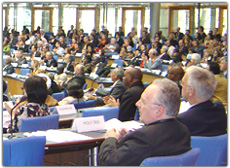 |
|
The Conference held from
31 March to 2 April 2009 at Bonn, Germany,
had over 700 participants from around 150
countries. It
was organised by
German Federal Ministry of Education and Research,
in cooperation with the German Commission for
UNESCO. |
|
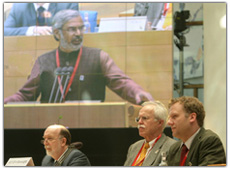 |
|
Mr. Kartikeya Sarabhai, the General Rapporteur for the 22 workshops,
speaking at the closing ceremony. |
|
A Conference
Declaration drafted through an open process was
unanimously adopted and is available on the website
www.esd-world-conference-2009.org.
|
|
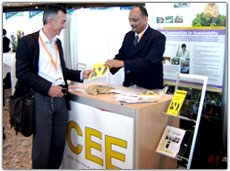 |
|
Two of CEE�s projects,
Samvardhan and
Global Communities for Sustainability
(GCS),
were displayed at the Best Practices Exhibition.
The projects were selected after a process that
finally identified 25 projects, 5 from each UNESCO
region. |
|
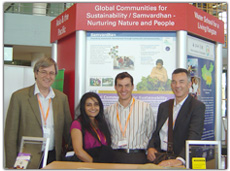 |
|
The GCS team from Australia, visited a school in Bonn to explore the
possibilities of starting GCS in Germany,
facilitated by CEE Germany. |
|
|
|
|
|
|
|
India Report on ESD
|
|
A senior level Indian
delegation comprising Secretary (Ministry of Human
Resource Development), UNESCO Representative to the
High Commission, Joint Secretary (Indian National
Commission for Cooperation with UNESCO), and Vice
Chancellor (National University of Educational
Planning and Administration) participated at the High
level segment, declaration drafting meetings,
workshops and the plenaries. The India stall was
placed at the Member States exhibition.
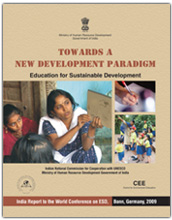 |
|
The India report on ESD
prepared for the Conference. |
|
|
|
|
|
|
Mountain Camps
"That which can be
learned in the classroom should be taught there, and
that which can be best learned in the outdoors should
there be taught."
Experiencing nature has been one of CEE's thrust areas
since its inception in 1984. Nature Camps are offered
by CEE at a number of places on Gujarat and other
states.
These camps are for all age groups.
Among the regular camping experiences offered by CEE
are the adventure camps held at Mt. Abu in Rajasthan.
Three
recent
camps saw the participation of 130 students between 10
and 13 years.
The activities during the 6-day camps are a unique combination of nature education and adventure moulded
in a format conducive to learning through experience.
Nature trails, bird watching, basic mountaineering
techniques of
rock climbing and abseiling; recognising the constellations
and observing their motion; and
|
|
|
|
|
|
|
|
|
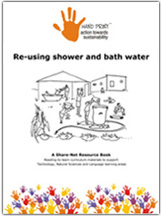 A
set of 12 Handprint Resource books have been developed in
South Africa by Rhodes University Environmental
Education and Sustainability Unit. These are for teacher
educators and teachers looking for practical ideas to work
in the learning areas of the National Curriculum. The
focus is on sustainability practices and locally relevant
knowledge support materials in the context of African
schools.
This marks a big step forward in
spreading the Handprint concept and providing practical
guidelines for action for sustainable development.
The books can be downloaded from
www.handsforchange.org. A
set of 12 Handprint Resource books have been developed in
South Africa by Rhodes University Environmental
Education and Sustainability Unit. These are for teacher
educators and teachers looking for practical ideas to work
in the learning areas of the National Curriculum. The
focus is on sustainability practices and locally relevant
knowledge support materials in the context of African
schools.
This marks a big step forward in
spreading the Handprint concept and providing practical
guidelines for action for sustainable development.
The books can be downloaded from
www.handsforchange.org.
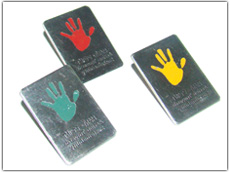 |
|
The Handprint Pin was a
great success at Bonn. |
|
Launched at the 4th International Conference on Environment
Education (ICEE) in Ahmedabad, India, November 2007, the Handprint, is a
concept developed by CEE to denote action towards
sustainability. Today, many partners across the globe are
promoting and further developing this tool.
|
|
|
|
|
Samvaad
� A Dialogue
33 villages
of Halvad, in Surendranagar District of Gujarat came together
with an aim to exchange ideas and experiences on,
rehabilitation and sustainable development. The Dialogue or
Samvaad was organised on 27 March 2009 by CEE in
association with CARE India,
a leading humanitarian
organisation fighting global poverty.
|
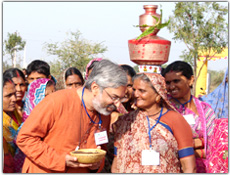 |
|
|
|
The
inauguration ceremony was carried out with a local
tradition, by bringing water and farm soil from
various project villages of CEE, for planting a
tree. |
|
The programme
included sessions on Self
Help Groups (SHGs), Field Farmer Schools (FFS)
and Village Development. The leaders shared their
experiences on micro-finance, self-development, sustainable
agriculture, and discussed about various issues faced by them
and their possible solutions during this sessions.
This also
marked the establishment of the Sustainable Development Centre
at Halvad by CEE. Mr. Kartikeya Sarabhai shared that, �today,
people are confused between using, scientific method or
traditional method. The need was felt to establish a centre
which could balance both the methods through continuous
dialogues. With support from CARE India, the centre will help to
achieve this goal'.
'The leadership needs the commitment involving the local
community and good liaison networking skills with various
sections of society and government and non-government
organisations,' said Mr.
Atul Pandya, Programme Director Rural Programmes Group.
|
|
|
|
A Developing Country Perspective for CSD-17 |
|
Seventy-six representatives from a variety of NGOs and CBOs spread
across India came together on 7 April 2009 at CEE,
Ahmedabad to discuss their perspectives on the
Commission on Sustainable Development (CSD) - 17
themes. The themes namely, Agriculture, Rural
Development, Drought, Land and Desertification.
Participants noted
that Indian thinking in rural areas was holistic and
did not look at sectors such as agriculture in
isolation, to issues of water, energy, livestock and
livelihoods.
Participants suggested
that there is a need for education on Code of GAP,
especially for developing countries. It was also
suggested that the skill development / vocational
training under non-farm sector should be imparted to
the local people and the course should be duly
certified by a recognised agency. A need was felt to
emphasise low interest regime for providing credit to
rural communities. It was also felt that the text
should take note of national and international
cooperation for protection of water bodies.
Participants also felt
that India has a lot to offer in terms of training,
capacity building and research.
The perspectives emerging
from the meeting will be taken in consideration while
finalising the India�s position for the CSD-17 meeting
to be held at New York
in May 2009.
|
|
|
|